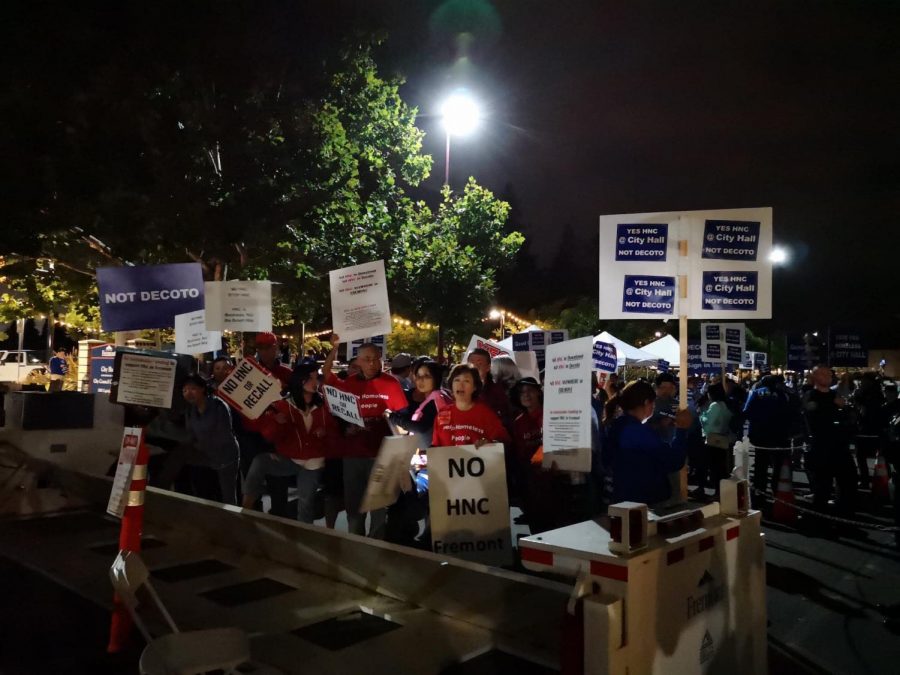Fremont votes 7-0 on City Hall site for Housing Navigation Center
Many Fremont residents that either opposed the Decoto site or the HNC in general attended the city council meeting in protest. Nearly 400 attendees lined up to speak in front of council members during the meeting, each given an allotted 45 seconds to make a statement.
September 16, 2019
On Sept. 10, Fremont City Council made a 7 to 0 decision to construct the planned Housing Navigation Center (HNC) at the City Hall location, which will be managed by Jamie Almanza, Executive Director of Bay Area Community Services (BACS). This decision served as the culmination of over a year’s worth of discourse and debate not only among City Council, but also Fremont residents, the most vocal of whom opposed the construction of such a center.
The potential construction of an HNC was initially proposed on Apr. 17, 2018 as a possible strategy to combat Fremont’s growing homeless population. According to the 2019 Alameda County Homeless Count and Survey Comprehensive Report, homelessness in the county has increased 43% since 2017, from 5,629 people to 8,022. By Sept. 18, 2018, Fremont declared a “Shelter Crisis” and allowed emergency action in response.
“We know that homelessness has been increasing over the last several years,” said Fremont Police Chief Kimberly Petersen. “We knew anecdotally that it was affecting our ability to provide public safety.”
On July 9, 2019, the City Council narrowed down the 11 proposed sites to 2: the Decoto Surplus Lot site and the City Hall site. In an online survey conducted by the city, 82.6% of responders preferred the City Hall site over the Decoto site. The Fremont residents in support of constructing the HNC at City Hall argued that placing the HNC in downtown Fremont would be the most logical decision in terms of convenience and safety.
“There are already a lot of encampments around [City Hall],” wrote an anonymous resident on a comment card at an HNC Community Workshop. “[City Hall is] close to social security services, medical services, police [department], public transportation, groceries, and a lot of job opportunities [are] nearby.”
However, a vocal group of residents strictly opposed the construction of the HNC anywhere in Fremont. Many attended City Hall meetings and the three HNC Community Workshops Fremont held during Aug. 2019 to express their concerns.
“No HNC in Decoto, downtown, or anywhere in Fremont,” said Jing Hong at the second of three HNC Community Workshops Fremont hosted at Harbor Light Church. “[The HNC] only provides two portable containers for 45 people, one bed, [and] one meal a day. Rotating a bed every 6 months makes things worse because it attracts more and more homeless singles from other cities to move to Fremont.”
The main concerns many residents had regarding an HNC in Fremont revolved around a potential increase in crime, drug use, and the proximity to schools, public parks, and residential areas. However, the city argued that there would be no increase in crime.
“The vast majority of our calls for service involving folks who were experiencing homelessness do not involve crime,” said Police Chief Petersen. “They typically are just a negative interaction between someone from our homeless community and someone from our general population or our business community.”
Petersen also cited the crime rates surrounding Berkeley’s STAIR Center — with a reported 82% success rate according to the HNC Frequently Asked Questions page — which the Fremont HNC has been modeled after.
“I called Berkeley PD and I was like, ‘Hey what’s your experience with your navigation center? We’re thinking of modeling ours after yours because it’s been so successful. What’s been your experience?’” said Police Chief Petersen. “Their analyst [got back to me] a few days later and said that [there was a] low to negligible rise in crime. There was one crime call in that time and that was in response to alarms, which they did not attribute to the homeless population.”
The council also asserts that an HNC in Fremont will not attract more homeless individuals into the city, as those who enter the center will have been native members of the Fremont homeless population vetted by BACS and the Police Department.
Fremont City Council’s proposed budget for the HNC include $3.7 million in funds from the state of California, $3.2 million in funds from the city of Fremont, and $800,000 in funds from Alameda County. Construction is expected to last from 8 to 11 months, and the HNC is predicted to be fully functioning by mid-2020.










